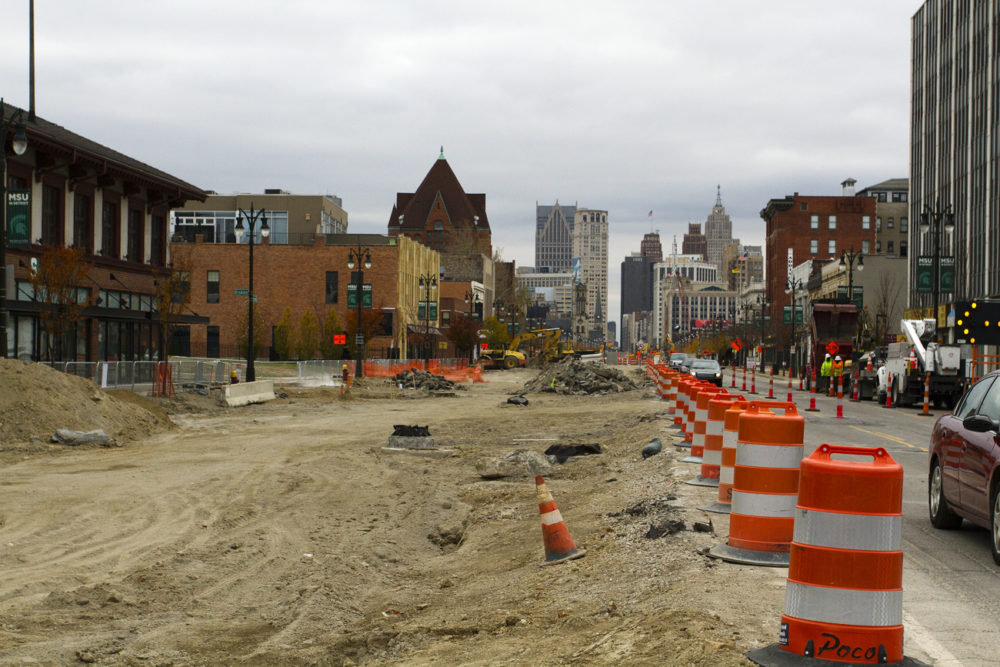
Although federal taxpayers forked over $37.2 million to help fund the delayed M-1 streetcar project in Detroit, rail officials have refused so far to disclose the budget or operating costs.
That’s important because metro Detroit voters are being asked in November to begin paying for operations of the streetcars in 2024 as part of a larger regional transit plan.
Motor City Muckraker requested a copy of the M-1 construction and operating budgets after a member of the M-1 Board of Directors expressed serious concerns about the project. The board member, who spoke on condition on anonymity, said the $179.4 million project is costing more than anticipated because of slower-than-expected construction. As a result, M-1 has less money to finance the operations, which originally were targeted at $5.5 million a year.
“There are some serious questions about paying for the operations,” I wrote in an e-mail to M-1 officials last week. “Right now operations are pegged at an estimated $5.5 million a year. Do you guys have an operating budget, may I see it and how much money does M-1 have in hand to operate the system? “
Sommer Woods, director of external relations, responded bluntly on Wednesday: “We don’t share budget information publicly.”
But after I contacted M-1 officials about her response, Woods apologized and pledged to provide “details” Thursday. That never happened.
On Monday, M-1 had yet to turn over any information.
A review of other streetcar projects found that operations often exceeded the anticipated costs, largely because of bloated ridership estimates and slow streetcars. M-1, for example, will take 25 minutes to travel from New Center to downtown, despite earlier pledges that it would take 8-12 minutes.
The Regional Transit Authority of Southeast Michigan (RTA) is asking voters to increase their property taxes to finance transportation improvements, bus rapid transit and M-1 operations.
According to the RTA, here are the estimated costs of operating the system, if ridership estimates prove to be correct:
2024: $6.2 million
2025: $6.3 million
2026: $6.3 million
2026: $6.4 million
2027: $6.5 million
2028: $6.6 million
2029: $6.6 million
2030: $6.7 million
2031: $6.8 million
2032: $6.9 million
2033: $7.0 million
2034: $7.1 million
2035: $7.2 million
The RTA pledged transparency.
“RTA is a public agency, and we are a people-based agency,” RTA spokesman Travis Gonyou told me. “We want to hear from people and make sure we do this right.”
M-1 officials insist their budget information is not public because most of the funding comes from private groups, which stand to profit from a project that still relies on tax dollars.
The streetcars were originally scheduled to open this month, but construction delays have pushed back the date to early 2017. But even that may be overly optimistic since the rail lines are still being built, the overhead electrical lines have not been installed and safety officials typically require two to three months of testing and training before passenger service begins.
The delays have hurt businesses along the rail line and caused traffic snarls.
The M-1 Board of Directors is led by two billionaires – Dan Gilbert and Roger Penske. The president and CEO of the M-1 is Matthew P. Cullen, who happens to be the CEO of Gilbert’s Rock Ventures.
Gilbert owns more than 80 buildings in downtown Detroit, has a stake in nearly 20,000 parking spaces and is embarking on a major housing project in Brush Park, which borders the M-1.
Premarin no prescription
http://buywithoutprescriptiononlinerx.net/kamagra.html
http://buywithoutprescriptiononlinerx.net
Steve Neavling
Steve Neavling lives and works in Detroit as an investigative journalist. His stories have uncovered corruption, led to arrests and reforms and prompted FBI investigations.

24 Responses to "M-1 officials decline to discuss funding problems; taxpayers on the hook"